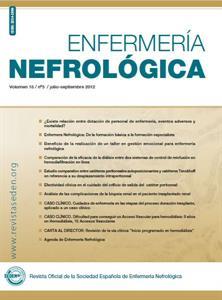Contenido del artículo principal
Resumen
La Enfermedad Renal Crónica (ERC) es un problema de salud pública que se asocia a una importante morbimortalidad cardiovascular y a costes elevados. Pese a que numerosos estudios afi rman que aproximadamente el 11% de la población adulta sufre algún grado de ERC1, se suele considerar una patologia rara y compleja. Afortunadamente solo una pequeña proporción de enfermos evoluciona hacia la insuficiencia renal terminal que necesite de tratamiento sustitutivo. Para evitar esta progresión es necesaria una actuación precoz sobre sus principales causas: hipertensión arterial y diabetes mellitus, pues en pacientes seguidos en atención primaria con estas enfermedades, la prevalencia de insuficiencia renal puede alcanzar cifras del 35-40%. Un número importante de pacientes con ERC están sin diagnosticar y se estima que alrededor del 20% de la población con más de 60 años tiene una ERC avanzada, es decir insufi ciencia renal.
Palabras clave
Detalles del artículo
Aviso de derechos de autor/a
© Los autores ceden de forma no exclusiva los derechos de explotación de los trabajos publicados y consiente en que su uso y distribución se realice con la Licencia Creative Commons Atribución - No comercial 4.0 Internacional (CC BY-NC 4.0). Puede consultar desde aquí la versión informativa y el texto legal de la licencia. Esta circunstancia ha de hacerse constar expresamente de esta forma cuando sea necesario.




